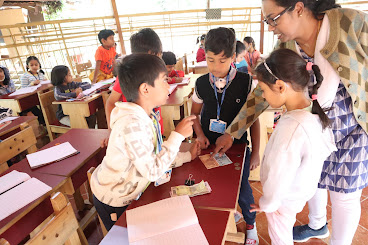Child's Learning Process
LEARNING PROCESS
by Dr. Ajit Sabnis
Human
brain is the result of millions of years of evolution and at present man is a
mental being. What does this mean? Without getting into the metaphysical
aspects, let us say, as a species, his (He and She) inquisitiveness can be
satiated by logic and reason. He is by no means the perfect being in the
evolutionary process. Brain is a physical organ that is being used as an
instrument for the learning process.
What Then Is
Learning?
The process of internalizing
information so as to be able to apply to real-life problem-solving situations
and come to more creative and fulfilling ways of living and responding to
life-conditions and situations.
Learning is a Physical Experience!
A dry and entirely academic learning experience never
satisfies the child. For a child, learning is as much physical as it is
emotional. In fact, a child is first and foremost a physical being. Then as it
grows, its emotional, mental, psychological and spiritual faculties get
expressed. To learn, the child must get involved emotionally.
· Learning is an Emotional Experience!
Learning involves the emotions. The traditional
teacher too often misses this vital aspect of the educational process. The
truly effective teacher is the one who understands the emotional nature of the
learner and is capable of evoking it in the process of learning.
Learning is an Integrative Process!
A physical, emotional and intellectual participation
in learning is only the initial process of learning: for an entirely effective
learning to happen, it is essential that the learner experiences an integration
of his-her physical, emotional and intellectual learning.
Learning is an Intellectual Experience!
It
is only after the child has been engaged physically and emotionally in his-her
learning process, that s-he comes to the intellectual level of learning. In other words, a real intellectual
learning is possible only when the learner has begun to participate physically
and emotionally in the learning process.
Learning, by its very nature, cannot be
fragmentary - the whole being of the learner needs to be involved in learning.
True learning
is learning that is assimilated and internalized. Such a thing is necessarily
integrative because only an experience that has been lived as much in the body
as in the emotions and in the intellect is deeply assimilated and internalized.
·
Learning is Experiential, Not Theoretical!
Theoretical learning can only be temporary and
superficial. Good Perhaps for examination but not good enough for real life. Learning
which can be assimilated and used in real life is essentially learning that is
experiential - i.e. learning based on, validated by experience.
What do we do?
·
Teach
subject for a longer period and allow assimilation time.
·
Club
core subject teaching with art and craft. For example, teach maths using craft.
·
Try
having creative class after each core subject.
·
Allow
children to make their own notes and discuss.
·
Introduce
deep breathing, chanting of AUM, Simple exercises, Dreaming, Imagination,
concentration etc.
Have a great and thoughtful Weekend !
Have a great and thoughtful Weekend !






Comments
Post a Comment